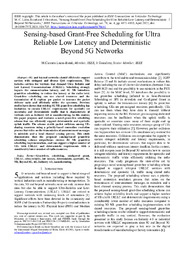Please use this identifier to cite or link to this item:
https://hdl.handle.net/11000/28491Full metadata record
| DC Field | Value | Language |
|---|---|---|
| dc.contributor.author | Lucas-Estañ, M. Carmen | - |
| dc.contributor.author | Gozalvez, Javier | - |
| dc.contributor.other | Departamentos de la UMH::Ingeniería de Comunicaciones | es_ES |
| dc.date.accessioned | 2022-11-29T10:53:45Z | - |
| dc.date.available | 2022-11-29T10:53:45Z | - |
| dc.date.created | 2022-02-24 | - |
| dc.identifier.citation | IEEE Transactions on vehicular technology, vol. 71, no. 4, april 2022 | es_ES |
| dc.identifier.issn | 1939-9359 | - |
| dc.identifier.issn | 0018-9545 | - |
| dc.identifier.uri | https://hdl.handle.net/11000/28491 | - |
| dc.description.abstract | 5G and beyond networks should efficiently support services with stringent and diverse QoS requirements. This includes services for verticals that demand Ultra Reliable and Low Latency Communications (URLLC). Scheduling strongly impacts the communication latency, and 5G NR introduces grant-free scheduling to reduce the latency at the radio level. Grant-free scheduling can use shared resources and the transmission of K replicas per packet to increase the packet delivery ratio and efficiently utilize the spectrum. Previous studies have shown that existing 5G NR grant-free scheduling has limitations to sustain URLLC requirements for aperiodic (or uncertain) and deterministic traffic that is characteristic of verticals such as Industry 4.0 or manufacturing. In this context, this paper proposes and evaluates a novel grant-free scheduling scheme that can efficiently support deterministic and aperiodic uplink traffic. The scheme avoids packet collisions among UEs sharing resources using a priority-based contention resolution process that relies on the transmission of announcement messages in minislots and a local channel sensing process. This study demonstrates that the proposed sensing-based grant-free scheduling scheme outperforms current 5G NR grant-free scheduling implementations, and can support a higher number of UEs with URLLC and deterministic requirements with a considerably lower number of radio resources. | es_ES |
| dc.description.sponsorship | This work has been funded by MCIN/AEI/10.13039/ 501100011033 through the project PID2020-115576RB-I00 | - |
| dc.description.sponsorship | and FSE funds through the grant PRE2018-084743, | - |
| dc.description.sponsorship | the Generalitat Valenciana through the project CIGE/2021/096, | - |
| dc.description.sponsorship | by a research grant awarded by the Vicerrectorado de Investigación of the UMH (2022). | - |
| dc.format | application/pdf | es_ES |
| dc.format.extent | 13 | es_ES |
| dc.language.iso | eng | es_ES |
| dc.publisher | Universidad Miguel Hernández de Elche | es_ES |
| dc.rights | info:eu-repo/semantics/openAccess | es_ES |
| dc.rights.uri | http://creativecommons.org/licenses/by-nc-nd/4.0/ | * |
| dc.subject | Grant-free | es_ES |
| dc.subject | scheduling | es_ES |
| dc.subject | configured grant | es_ES |
| dc.subject | URLLC | es_ES |
| dc.subject | ultra reliable | es_ES |
| dc.subject | low latency | es_ES |
| dc.subject | deterministic | es_ES |
| dc.subject | aperiodic | es_ES |
| dc.subject | 5G | es_ES |
| dc.subject | 6G | es_ES |
| dc.subject | Industry 4.0 | es_ES |
| dc.subject | manufacturing | es_ES |
| dc.subject.other | CDU::6 - Ciencias aplicadas::62 - Ingeniería. Tecnología::621 - Ingeniería mecánica en general. Tecnología nuclear. Electrotecnia. Maquinaria::621.3 - Ingeniería eléctrica. Electrotecnia. Telecomunicaciones | es_ES |
| dc.title | Sensing-Based Grant-Free Scheduling for Ultra Reliable Low Latency and Deterministic Beyond 5G Networks | es_ES |
| dc.type | info:eu-repo/semantics/article | es_ES |
| dc.identifier.doi | 10.1109/ETFA52439.2022.9921528 | - |
| dc.relation.publisherversion | https://doi.org/10.1109/ETFA52439.2022.9921528 | - |

View/Open:
SENSING- TVT2022_LucasGozalvez_Sensing-based Grant-Free Scheduling for URLLC (1).pdf
635,07 kB
Adobe PDF
Share:
.png)
